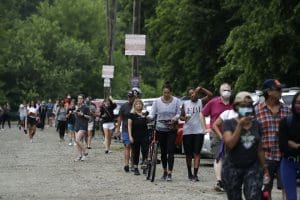'Complete meltdown': Georgia voters wait in line for hours to cast ballots amid pandemic
Widespread problems included trouble with Georgia’s new voting system and a shortage of poll workers.

Some voters waited more than three hours to cast ballots on Tuesday amid reports of voting machine malfunctions in Georgia, a general election battleground, which held twice-delayed primary elections with a shortage of poll workers and social-distancing precautions caused by the coronavirus.
Widespread problems included trouble with Georgia’s new voting system that combines touchscreens with scanned paper ballots in races for president, U.S. Senate, and dozens of other contests. Some voters said they joined the lines after requesting mail-in ballots that never arrived. One state lawmaker, Rep. William Boddie of Atlanta, said there was a “complete meltdown” in Georgia’s largest county, where people of color represent a majority of the population.
Americans were also voting Tuesday in primaries in West Virginia, Nevada, and South Carolina following months of social restrictions to guard against the spread of COVID-19 and a week of massive protests against police brutality.
Perhaps more than other states, Georgia offers the most significant test to date for whether the energy related to protests across the nation would translate to political change at the voting booth. The problems that plagued the state’s voting system, however, will likely make it difficult to draw any firm conclusions.
Georgia’s issues come after voters were forced to wait hours to cast ballots in recent primary contests in places like Wisconsin and Washington, D.C.
While there were no reports of machine malfunctions in other states, the number of voting places was dramatically reduced in virtually every state that has held in-person voting in recent weeks to accommodate a drop in poll workers because of the pandemic. The consolidation has disproportionately affected urban minority communities, although long lines were reported on Tuesday in whiter suburban areas as well.
Even before Georgia voters ran into problems Tuesday, the state’s chief election officer warned that results may be slow to come in as poll closures and virus restrictions complicate in-person voting and counties work to process a huge increase in ballots received by mail.
Layla Cantlebary waited more than an hour to vote at an elementary school in the Atlanta suburb of Roswell, where she arrived to find a long line a few minutes before polling sites opened at 7 a.m. She had planned to vote by mail but said her absentee ballot never arrived.
“I always vote in primaries, but the political times that we’re having right now, or the moment that we’re having, is scary,” Cantlebary, 39, said as she stood with about 60 others waiting to vote. “With all the civil unrest, it just underscores the importance of coming out and voting for somebody who you feel is going to lead the country to a better place than we are in currently.”
Outside a recreation center being used as a polling site in Atlanta, some voters said they had been waiting for nearly four hours in a line that wrapped around the block. At another site off Atlanta’s Piedmont Park, several people walked up, looked at the line wrapped around the parking lot, and then left, shaking their heads in frustration.
Atlanta Mayor Keisha Lance Bottoms said voters in line at one of Atlanta’s largest precincts reported all the machines were down. She encouraged voters not to give up.
“If you are in line, PLEASE do not allow your vote to be suppressed,” the mayor said on Twitter.
The problems weren’t just limited to the Atlanta area. In Savannah, Mayor Van Johnson said he was “inundated” with phone calls Tuesday morning from voters reporting “extensive delays.” Election officials in surrounding Chatham County were requesting an extension of voting hours.
Gabriel Sterling, who managed the rollout of Georgia’s new $120 million voting system for Republican Secretary of State Brad Raffensperger, said Tuesday he had heard of no “actual equipment issues” but rather of delayed deliveries of voting equipment and problems with polls workers “not understanding setup or how to operate voting equipment.”
Sterling blamed “counties engaging in poor planning, limited training, and failures of leadership.”
Since the pandemic began, states have been scrambling to address concerns about voting in person. The nation’s elections rely on an army of poll workers, many of them older, and the use of neighborhood locations such as schools, recreation centers, and senior living communities for polling places.
With the coronavirus, however, poll workers dropped out and the number of available voting sites has shrunk, resulting in a significant consolidation of polling places and long lines. Experts have warned that election officials must take additional steps to ensure voting is easier in November.
Many states, including Georgia, have pushed to expand the use of absentee ballots in the hopes of reducing the number of people voting in person. For the first time, Georgia sent absentee ballot applications to all active registered voters.
Democratic National Committee Chairman Tom Perez said Tuesday he wasn’t surprised that Georgia had voting problems given that the state’s elections chief is a Republican. He noted that GOP Gov. Brian Kemp faced allegations of suppressing votes when he oversaw the 2018 elections as secretary of state.
“Anytime you have an election in Georgia with the governor’s infamous history, and now the current secretary of state following Gov. Kemp’s infamous history, there is reason for concern,” Perez said in an interview. “Republicans want to ensure that it is as hard as possible for people to vote.”
Georgia has emerged as a battleground state in the fall contest between Donald Trump and Democratic challenger Joe Biden. Biden in particular hoped to emerge as the prime beneficiary of the massive protests being held for more than a week.
The former vice president’s path to the presidency was already focused on maximizing black turnout and expanding his alliance with white suburbanites and city dwellers, young voters, Asian Americans, and Latinos. Trump, meanwhile, hopes to demonstrate strength among his base of white voters in small towns while holding his own in metro areas.
While there was no real competition for each of the presidential candidates on Tuesday, Georgia is a must-win for the Republican president in November.
The state offers a wide swath of rural and small-town counties where Trump remains immensely popular among white majorities. His margins there four years ago helped overcome his deficits in metropolitan areas, including losses in key suburban Atlanta counties that hadn’t been won by Democrats in a presidential election in four decades.
But Democrats point to their successes since — and to voter registration trends that show a swath of new voters in the metropolitan areas where the GOP has struggled.
Biden’s campaign manager, Jen O’Malley Dillon, mentions Georgia along with Arizona and Texas as the next three states that Democrats can flip. Still, O’Malley Dillon holds up Arizona as the best opportunity for Democrats, implicitly tamping down expectations in Georgia.
Recommended

New NC GOP chair flirts with bogus stolen election conspiracies
Simmons predecessor was a staunch 2020 election denier
By Jesse Valentine - April 19, 2024
Texas activists pushed abortion restrictions in NM cities and counties, records show
Emails reveal influence and control in exchange for promises of legal help
By Austin Fisher, Source NM - March 04, 2024
Cannabis workers across Missouri begin push to unionize dispensaries
The first day was a breeze. Sean Shannon and Danny Foster walked into several marijuana dispensaries around Missouri with their matching “Union For Cannabis Workers” shirts and talked to employees about the possibility of unionizing. “The first day, there were 57 stops amongst the teams,” said Shannon, lead organizer with UFCW Local 655, which actually […]
By Rebecca Rivas - December 04, 2023















































































